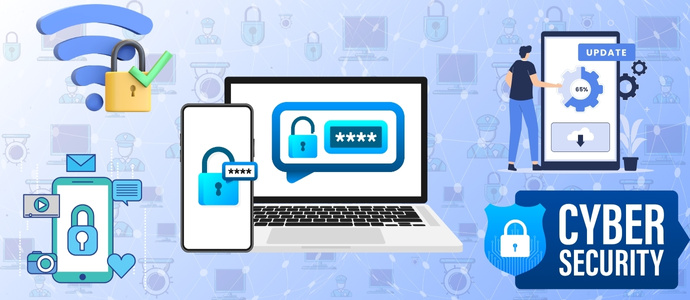The internet is a vast and amazing resource that allows us to stay in touch with family, friends, and information from across the world. However, using caution and awareness when navigating the online world is just as essential as doing so in the actual world. Since cybersecurity dangers are always changing, knowing how to stay safe online is essential.
This blog post is your Cybersecurity 101 manual, giving you the knowledge and practical tips you need to protect your privacy on the internet.

Passwords: Your First Line of Defense
Consider your passwords to be the keys to your accounts on the internet. Weak passwords are easily cracked by hackers, much like cheap locks. Here’s how to make your account’s password strong and different:
- Modify things up: Employ a mix of numbers, symbols, and capital and lowercase letters.
- Stay clear of the obvious: Avoid using dictionary words, pet names, and birthdays.
- Consider unusual ideas: Passwords should not be used on several platforms.
Complex passwords can be difficult to remember. Use a password manager, which is a safe tool that keeps track of and encrypts your login information.
Two-Factor Authentication (2FA): Double the Security
Beyond simply your password, 2FA adds an extra degree of security. When activated, after entering your login information, you’ll receive a temporary code to enter (via text message, authentication app, etc.). This additional safety measure lowers the likelihood of unauthorized access considerably, even in the event that your password is hacked.
Software Updates: Patching the Gaps
Software Updates are frequently released by software developers to address bugs in their products. Updates for recently identified bugs are frequently included in these releases. Updating your web browser, operating system, and other apps is crucial to keeping your defenses against cyberattacks strong.
Watch Out for Hacking Hooks
Fraud emails and texts try to fool you into disclosing private information or opening dangerous links. They frequently give the impression of coming from reliable sources, such as banks, social media sites, or even friends. The following are warning signs to be aware of:
- Pressure & Urgency: Emails that are fake frequently generate a sense of urgency, pressuring you to respond right away.
- Dubious Connections and Attachments: Avoid opening attachments or clicking links from senders you don’t recognize. Before clicking, hover your cursor over the link to view the real destination URL.
- Greetings in general: Authentic emails from organizations will usually use your name.
If you have any doubts about the legitimacy of an email, get in touch with the sender immediately via a trusted channel to make sure.
Guarding Your Social Media Presence
Although social media sites provide an insight into our lives, excessive sharing might put your security at risk. Think carefully before sharing any information in public. Don’t provide personal information like your birthdate, phone number, or home address online.
Moreover, be cautious when accepting friend requests from unknown individuals. Before establishing a connection, look over their profiles and keep clear of accounts with little information or suspicious activities.
Securing Your Wi-Fi Connection
Despite their convenience, public Wi-Fi networks are frequently unsafe. It is easy for hackers to intercept data being sent over these networks. Stay clear of sensitive information like bank accounts and online transactions when using public Wi-Fi. To encrypt your internet traffic and provide an additional degree of security, think about utilizing a Virtual Private Network (VPN).
- Safeguarding Your Devices: Security precautions are needed for your tablet and smartphone as well, just like for your computer.
- Turn on the screen lock: To safeguard your smartphone, use a fingerprint scan, facial recognition, or a strong PIN.
- Install programs effectively: Download software only from reputable sites, such as legitimate app shops.
- Watch out for dubious downloads: Don’t download files from unknown websites.
Beyond the Basics: Building Cybersecurity Awareness
Staying informed about the latest cyber threats is crucial for proactive defense. Here are some additional tips:
- Be skeptical of online offers: If something seems too good to be true, it probably is.
- Regularly back up your data: Having a backup ensures you don’t lose important information in case of a cyberattack.
- Stay informed: Subscribe to reputable cybersecurity blogs and websites to learn about emerging threats and best practices.
By following these essential steps and maintaining a vigilant approach, you can significantly improve your online security posture. Remember, cybersecurity is an ongoing process, not a one-time fix. By implementing these practices and staying informed, you can navigate the digital world with confidence and peace of mind.

